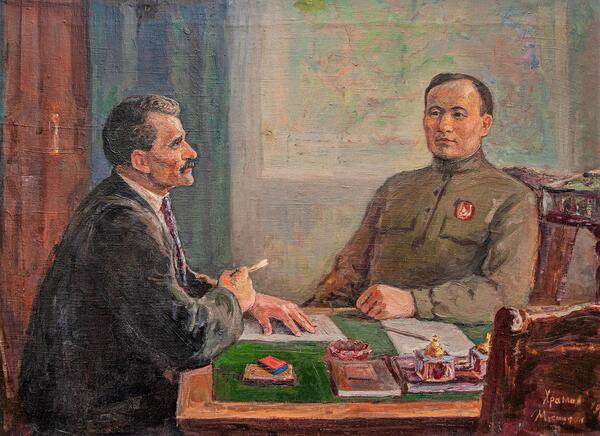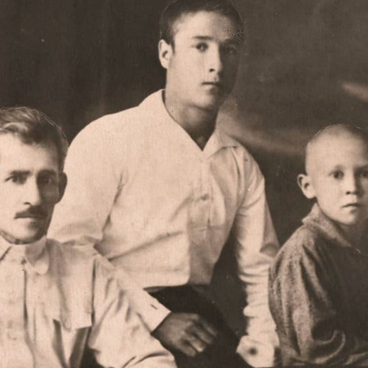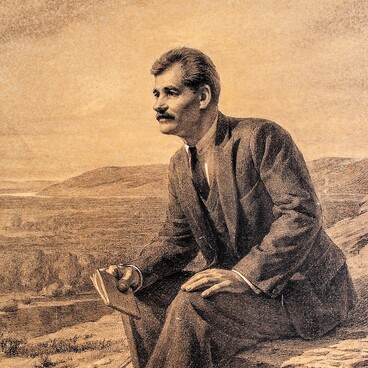The picture shows the poet Majit Gafuri at the meeting with Shagit Khudayberdin, a revolutionary, writer and statesman. He was one of Gafuri’s comrades-in-arms and a well-known publicist, Shagit suffered many shocks related to the revolutionary and military events of the early 20th century.
Shagit Khudayberdin lived only 28 years. He was born in 1896 in the Psyanchino aul and, after graduating from school, he went to enroll at the Orenburg madrassa “Khusainiya”, the higher Muslim educational institution. However, he failed to complete his studies. In 1914, Khudayberdin was drafted into the tsarist army and sent to the front as a company paramedic after a short course. Having been wounded, he returned home.
After the October Revolution, Khudayberdin actively conducted propaganda work among the Bashkirs and Tatars. In May 1917, he also headed the newly created Ufa Muslim Military Council, which sought to develop the political consciousness of soldiers. For some time, Khudayberdin also worked for the Higher Military Inspectorate. And during the Civil War, he headed the Red Guard Tatar-Bashkir detachment and fought against the White Army.
At the end of 1919, Khudayberdin returned to Bashkiria and became a prominent party functionary: he was a political secretary of the Bashkir Committee of the RCP (b), a deputy commissar of agriculture and the head of the People’s Commissariat of Internal Affairs. He played a big role as the Chairman of the Commission for the Implementation of the Bashkir Language. In particular he did his best to give the Bashkir language the status of the state language of the republic. However, Khudayberdin died in 1924 and was buried in Ufa.
The poet Majit Gafuri and Shagit Khudayberdin were friends and like-minded persons. Moreover, Khudayberdin was open to literature and published several stories during his lifetime. Shocked by Shagit’s death, Gafuri wrote a poem dedicated to him:
Shagit Khudayberdin lived only 28 years. He was born in 1896 in the Psyanchino aul and, after graduating from school, he went to enroll at the Orenburg madrassa “Khusainiya”, the higher Muslim educational institution. However, he failed to complete his studies. In 1914, Khudayberdin was drafted into the tsarist army and sent to the front as a company paramedic after a short course. Having been wounded, he returned home.
After the October Revolution, Khudayberdin actively conducted propaganda work among the Bashkirs and Tatars. In May 1917, he also headed the newly created Ufa Muslim Military Council, which sought to develop the political consciousness of soldiers. For some time, Khudayberdin also worked for the Higher Military Inspectorate. And during the Civil War, he headed the Red Guard Tatar-Bashkir detachment and fought against the White Army.
At the end of 1919, Khudayberdin returned to Bashkiria and became a prominent party functionary: he was a political secretary of the Bashkir Committee of the RCP (b), a deputy commissar of agriculture and the head of the People’s Commissariat of Internal Affairs. He played a big role as the Chairman of the Commission for the Implementation of the Bashkir Language. In particular he did his best to give the Bashkir language the status of the state language of the republic. However, Khudayberdin died in 1924 and was buried in Ufa.
The poet Majit Gafuri and Shagit Khudayberdin were friends and like-minded persons. Moreover, Khudayberdin was open to literature and published several stories during his lifetime. Shocked by Shagit’s death, Gafuri wrote a poem dedicated to him:



